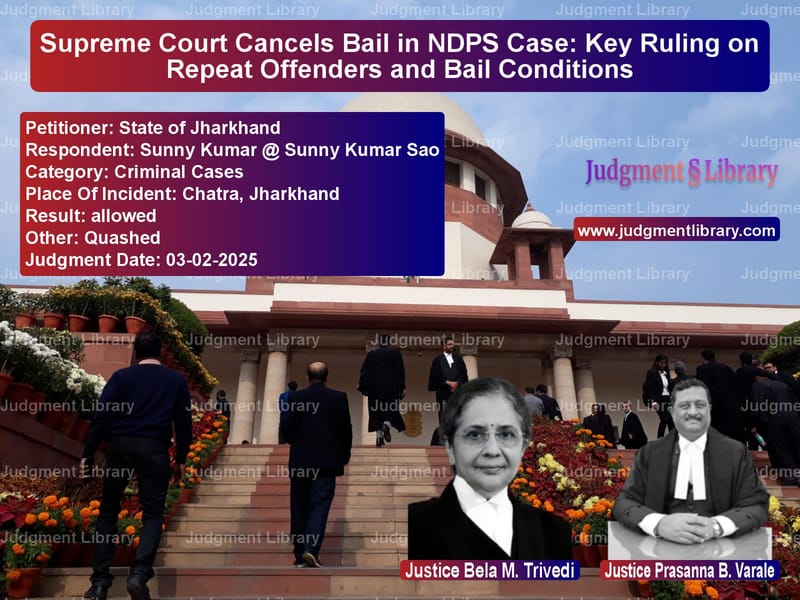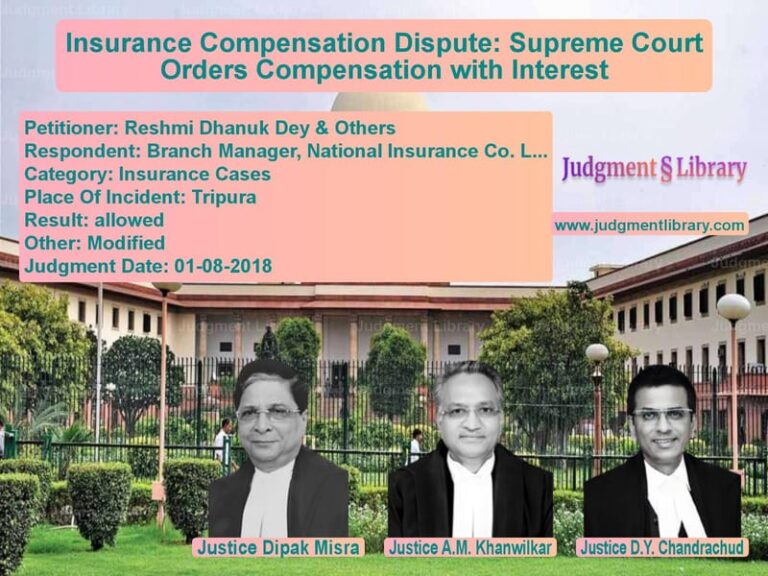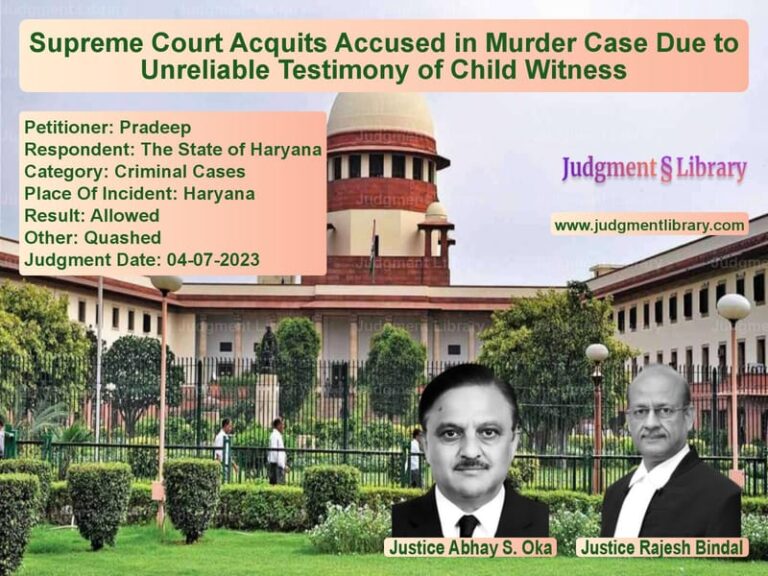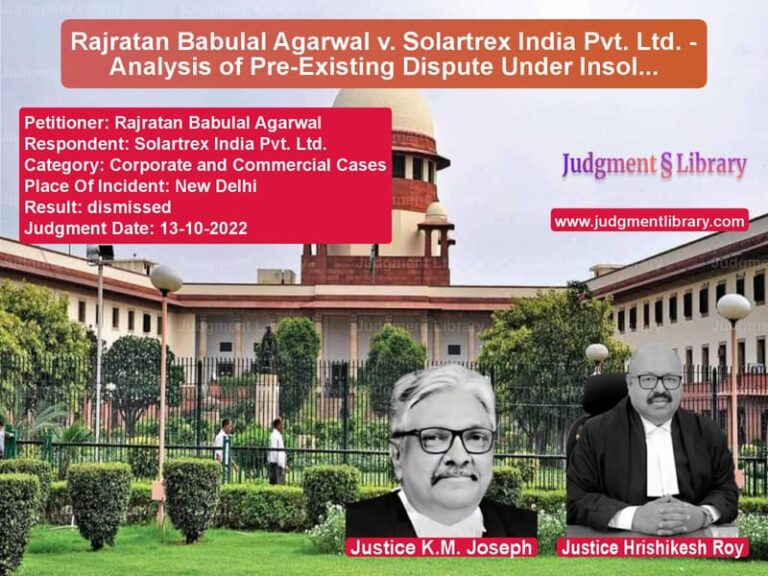Supreme Court Cancels Bail in NDPS Case: Key Ruling on Repeat Offenders and Bail Conditions
In a landmark judgment, the Supreme Court of India set aside the bail granted to an accused in a drug-related case under the Narcotic Drugs and Psychotropic Substances (NDPS) Act, reinforcing the strict approach required in drug-related offenses. The case revolved around the bail granted to Sunny Kumar @ Sunny Kumar Sao by the Jharkhand High Court, which was subsequently challenged by the State of Jharkhand due to the accused’s involvement in a similar offense post-release.
Background of the Case
The case originated from Case No. 231 of 2022, registered at Sadar Police Station, District Chatra, Jharkhand, where the accused was booked under Section 18 of the NDPS Act. The accused was granted bail by the Jharkhand High Court on November 24, 2022. However, he was later arrested again on July 12, 2023, in connection with another NDPS case.
Legal Issues Raised
- Whether the High Court erred in granting bail despite the serious nature of the NDPS charges.
- The impact of the accused’s subsequent arrest on the validity of the bail order.
- Application of Section 37 of the NDPS Act concerning bail restrictions in drug-related offenses.
Arguments by the State
The State of Jharkhand, represented by the prosecution, strongly contested the High Court’s decision to grant bail. The key arguments included:
- The accused misused his bail privilege and was arrested again in a similar offense, proving his involvement in repeated criminal activities.
- The High Court did not adequately consider the provisions of Section 37 of the NDPS Act, which imposes stricter conditions on granting bail in drug-related cases.
- The trial in the present case had already commenced, with only three witnesses left to be examined, making the accused’s presence in custody crucial.
“After the release of the respondent-accused on bail, he was involved in another case under the NDPS Act. The grant of bail in such cases must be reconsidered in light of public interest and legal precedent.”
Defense’s Arguments
The defense counsel countered the State’s claims, asserting that:
- The quantity of contraband recovered in the first case was of intermediate quantity and not commercial, making Section 37 of the NDPS Act inapplicable.
- The State’s challenge was against the initial grant of bail and not a cancellation based on breach of conditions, making the appeal less relevant.
- The accused was already in custody for the second case, and the present challenge was unnecessary.
“The recovery of the alleged contraband was not of commercial quantity, and therefore, the rigors of Section 37 would not be applicable.”
Supreme Court’s Observations
The Supreme Court critically examined the High Court’s decision and observed:
- The accused’s subsequent arrest in a similar case demonstrated a pattern of criminal conduct, warranting stricter judicial scrutiny.
- NDPS cases require careful judicial handling due to their severe implications on public health and order.
- The trial was already nearing completion, making it necessary to ensure the accused’s availability for legal proceedings.
“We deem it appropriate to set aside the impugned order passed by the High Court. The accused is directed to be taken into custody in connection with Case No. 231 of 2022.”
Key Judicial Precedents Considered
The Court referred to various judgments emphasizing the principles of bail under the NDPS Act, including:
- Union of India v. Shiv Shanker Kesari – Reinforcing that bail should not be granted lightly in drug-related cases.
- State of Kerala v. Rajesh – Stating that under the NDPS Act, bail should be an exception and not the rule.
- Ranjitsing Brahmajeetsing Sharma v. State of Maharashtra – Highlighting that bail should consider the impact on society.
Final Verdict
The Supreme Court concluded:
“The impugned order dated 24.11.2022, passed by the High Court of Jharkhand, is set aside. The respondent-accused is directed to be taken into custody. The Trial Court is directed to expedite the trial and conclude it within four months.”
Significance of the Judgment
This ruling establishes critical legal principles:
- Courts must exercise extreme caution while granting bail in NDPS cases.
- Repeated offenses after bail must be treated as a strong ground for reconsideration.
- The judiciary plays a vital role in preventing misuse of bail provisions in drug-related crimes.
This judgment reinforces the strict approach towards drug offenses, ensuring that the legal framework remains robust in combating the menace of narcotics in India.
Petitioner Name: State of Jharkhand.Respondent Name: Sunny Kumar @ Sunny Kumar Sao.Judgment By: Justice Bela M. Trivedi, Justice Prasanna B. Varale.Place Of Incident: Chatra, Jharkhand.Judgment Date: 03-02-2025.
Don’t miss out on the full details! Download the complete judgment in PDF format below and gain valuable insights instantly!
Download Judgment: state-of-jharkhand-vs-sunny-kumar-@-sunny-supreme-court-of-india-judgment-dated-03-02-2025.pdf
Directly Download Judgment: Directly download this Judgment
See all petitions in Bail and Anticipatory Bail
See all petitions in Drug Possession Cases
See all petitions in Judgment by Bela M. Trivedi
See all petitions in Judgment by Prasanna Bhalachandra Varale
See all petitions in allowed
See all petitions in Quashed
See all petitions in supreme court of India judgments February 2025
See all petitions in 2025 judgments
See all posts in Criminal Cases Category
See all allowed petitions in Criminal Cases Category
See all Dismissed petitions in Criminal Cases Category
See all partially allowed petitions in Criminal Cases Category







